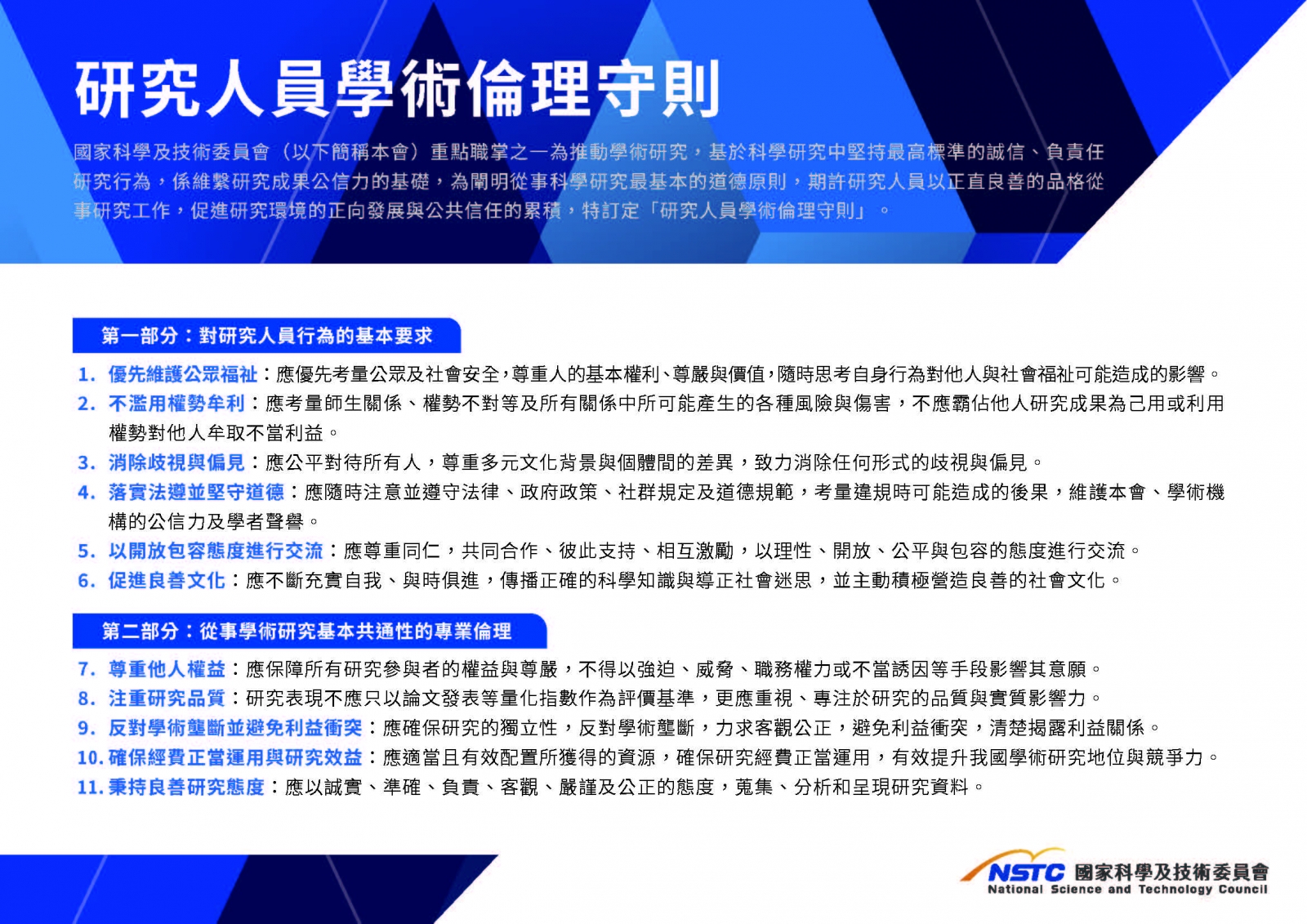【轉知/訊息Notice】國家科學及技術委員會「研究人員學術倫理守則」/ “Code of Academic Ethics for Researchers”, Issued by the National Science and Technology Council (NSTC)
更新時間:2025-09-19 17:45:39 /
張貼時間:2025-09-19 17:44:21
學術發展組
單位研發處學術發展組
830
國家科學及技術委員會「研究人員學術倫理守則」,請參考,並鼓勵各學術領域可據以訂定各專業社群之學術倫理守則。
國家科學及技術委員會(以下簡稱本會)重點職掌之一為推動學術研究,基於科學研究中堅持最高標準的誠信、負責任研究行為,係維繫研究成果公信力的基礎,為闡明從事科學研究最基本的道德原則,期許研究人員以正直良善的品格從事研究工作,促進研究環境的正向發展與公共信任的累積,特訂定「研究人員學術倫理守則」。
第一部分:對研究人員行為的基本要求
1.優先維護公眾福祉:應優先考量公眾及社會安全,尊重人的基本權利、尊嚴與價值,隨時思考自身行為對他人與社會福祉可能造成的影響。
2.不濫用權勢牟利:應考量師生關係、權勢不對等及所有關係中所可能產生的各種風險與傷害,不應霸佔他人研究成果為己用或利用權勢對他人牟取不當利益。
3.消除歧視與偏見:應公平對待所有人,尊重多元文化背景與個體間的差異,致力消除任何形式的歧視與偏見。
4.落實法遵並堅守道德:應隨時注意並遵守法律、政府政策、社群規定及道德規範,考量違規時可能造成的後果,維護本會、學術機構的公信力及學者聲譽。
5.以開放包容態度進行交流:應尊重同仁,共同合作、彼此支持、相互激勵,以理性、開放、公平與包容的態度進行交流。
6.促進良善文化:應不斷充實自我、與時俱進,傳播正確的科學知識與導正社會迷思,並主動積極營造良善的社會文化。
第二部分:從事學術研究基本共通性的專業倫理
7.尊重他人權益:應保障所有研究參與者的權益與尊嚴,不得以強迫、威脅、職務權力或不當誘因等手段影響其意願。
8.注重研究品質:研究表現不應只以論文發表等量化指數作為評價基準,更應重視、專注於研究的品質與實質影響力。
9.反對學術壟斷並避免利益衝突:應確保研究的獨立性,反對學術壟斷,力求客觀公正,避免利益衝突,清楚揭露利益關係。
10.確保經費正當運用與研究效益:應適當且有效配置所獲得的資源,確保研究經費正當運用,有效提升我國學術研究地位與競爭力。
11.秉持良善研究態度:應以誠實、準確、負責、客觀、嚴謹及公正的態度,蒐集、分析和呈現研究資料。
The National Science and Technology Council (hereafter “the Council”) is committed to promoting academic research based on the highest standards of integrity and responsible conduct. Upholding research credibility is essential for public trust. To articulate the fundamental moral principles in scientific research and encourage researchers to conduct their work with honesty and integrity, thereby fostering a positive research environment, the Council has established the Code of Academic Ethics for Researchers. Academic communities are encouraged to adapt this Code to develop field-specific ethical guidelines.
Part I: Fundamental Requirements for Researchers

國家科學及技術委員會(以下簡稱本會)重點職掌之一為推動學術研究,基於科學研究中堅持最高標準的誠信、負責任研究行為,係維繫研究成果公信力的基礎,為闡明從事科學研究最基本的道德原則,期許研究人員以正直良善的品格從事研究工作,促進研究環境的正向發展與公共信任的累積,特訂定「研究人員學術倫理守則」。
第一部分:對研究人員行為的基本要求
1.優先維護公眾福祉:應優先考量公眾及社會安全,尊重人的基本權利、尊嚴與價值,隨時思考自身行為對他人與社會福祉可能造成的影響。
2.不濫用權勢牟利:應考量師生關係、權勢不對等及所有關係中所可能產生的各種風險與傷害,不應霸佔他人研究成果為己用或利用權勢對他人牟取不當利益。
3.消除歧視與偏見:應公平對待所有人,尊重多元文化背景與個體間的差異,致力消除任何形式的歧視與偏見。
4.落實法遵並堅守道德:應隨時注意並遵守法律、政府政策、社群規定及道德規範,考量違規時可能造成的後果,維護本會、學術機構的公信力及學者聲譽。
5.以開放包容態度進行交流:應尊重同仁,共同合作、彼此支持、相互激勵,以理性、開放、公平與包容的態度進行交流。
6.促進良善文化:應不斷充實自我、與時俱進,傳播正確的科學知識與導正社會迷思,並主動積極營造良善的社會文化。
第二部分:從事學術研究基本共通性的專業倫理
7.尊重他人權益:應保障所有研究參與者的權益與尊嚴,不得以強迫、威脅、職務權力或不當誘因等手段影響其意願。
8.注重研究品質:研究表現不應只以論文發表等量化指數作為評價基準,更應重視、專注於研究的品質與實質影響力。
9.反對學術壟斷並避免利益衝突:應確保研究的獨立性,反對學術壟斷,力求客觀公正,避免利益衝突,清楚揭露利益關係。
10.確保經費正當運用與研究效益:應適當且有效配置所獲得的資源,確保研究經費正當運用,有效提升我國學術研究地位與競爭力。
11.秉持良善研究態度:應以誠實、準確、負責、客觀、嚴謹及公正的態度,蒐集、分析和呈現研究資料。
The National Science and Technology Council (hereafter “the Council”) is committed to promoting academic research based on the highest standards of integrity and responsible conduct. Upholding research credibility is essential for public trust. To articulate the fundamental moral principles in scientific research and encourage researchers to conduct their work with honesty and integrity, thereby fostering a positive research environment, the Council has established the Code of Academic Ethics for Researchers. Academic communities are encouraged to adapt this Code to develop field-specific ethical guidelines.
Part I: Fundamental Requirements for Researchers
- Prioritize Public Welfare: Safeguard public and social safety, respect human rights, dignity, and values, and consider the societal impact of one’s actions.
- Avoid Abuse of Power: Prevent exploitation in power-imbalanced relationships, refrain from misappropriating others’ research, and avoid using authority for personal gain.
- Eliminate Discrimination and Bias: Treat all individuals fairly, respect diversity, and work to eliminate any form of discrimination or prejudice.
- Comply with Laws and Ethics: Abide by laws, government policies, institutional rules, and ethical norms; recognize the consequences of violations and safeguard institutional and scholarly credibility.
- Foster Open and Respectful Exchange: Respect colleagues, collaborate fairly, and engage in open, rational, and inclusive dialogue.
- Promote a Positive Culture: Continue self-improvement, disseminate accurate scientific knowledge, counter misinformation, and help build a virtuous social culture.
- Respect the Rights of Participants: Protect participants’ rights and dignity; avoid coercion, threats, abuse of authority, or undue inducement.
- Focus on Research Quality: Value research quality and real impact over quantitative indicators such as publication counts.
- Avoid Monopolies and Conflicts of Interest: Ensure research independence, resist academic monopolies, remain objective, and fully disclose relevant interests.
- Ensure Proper Use of Resources: Allocate resources appropriately, use research funds responsibly, and enhance the nation’s research competitiveness.
- Maintain Integrity in Research: Collect, analyze, and present data honestly, accurately, responsibly, objectively, rigorously, and fairly.

- 本訊息負責人 盧錦惠
- 電話 04-22840550#302
- E-mail vmlab@nchu.edu.tw
- 相關附件 線上_1140020561_便簽-「研究人員學術倫理守則」.pdf 、 國家科學及技術委員會研究人員學術倫理守則1140916.pdf

